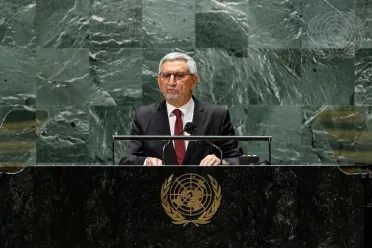Statement
Statement summary
JORGE CARLOS DE ALMEIDA FONSECA, President of Cabo Verde, said that the fact that the General Assembly was meeting in person again was a sign of the international community’s determination to overcome the COVID-19 pandemic and build a more resilient world. Pointing to the Secretary-General’s report “Our Common Agenda”, he said that Cabo Verde has no doubt about the future it wants. He added his support for the proposal for a Summit of the Future in 2023 to forge a new global consensus of what the future should look like and how it can be ensured.
Cabo Verde graduated to middle-income status in 2008, achieved most of the Millennium Development Goals in 2015 and aligned itself with the Sustainable Development Goals, he noted. However, the pandemic triggered a 14.8 per cent reduction in economic growth. To that end, his country responded by defining a common vision called Cabo Verde 2030 to draw upon lessons learned and rebuild better. The priority is to fight COVID-19, and, to that end, 74 per cent of the eligible population has been vaccinated. The reciprocal recognition of vaccine certificates and the revision of travel warning has enabled Cabo Verde to support the return of tourists, he added.
He called for the adoption of a multidimensional vulnerability index for small island developing States like Cabo Verde that would assist the effective implementation of the commitments laid out in the Small Island Developing States Accelerated Modalities of Action (SAMOA Pathway). The challenges faced by small island developing States, and solutions to those problems, should be included in the Summit of the Future, with opportunities for them to make decisions that meet their legitimate interests and aspirations, he said.
Revitalizing the United Nations means reforming the Security Council, he said, emphasizing that Cabo Verde, as an African Union member, subscribed to the Ezulwini Consensus. The pandemic is part of a chain of other crises, including climate change and geopolitical conflicts, which, due to their interconnected nature, has accentuated the gap between the haves and have-nots. “The missing link between crisis and opportunity lies in the exercise of greater global solidarity” and creating solutions to build “the future we want” and “the United Nations we need,” he stressed.
Although “the future we want” is inscribed in the Charter of the United Nations, the question of “the United Nations we need” has always been a subject for debate, he continued. Results achieved so far by the United Nations system could be vastly improved in all areas through collective action. Strengthened multilateralism is the way forward. With his second term in office coming to an end, he also noted that this would be his last address to the Assembly as Head of State, adding that he will have good memories of the hall.
Full statement
Read the full statement, in PDF format.
Photo

Previous sessions
Access the statements from previous sessions.
